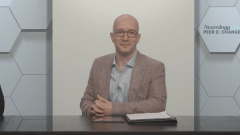
Sequencing Disease-Modifying Therapies in Multiple Sclerosis
Stephen Krieger, MD; Daniel Bandari, MD, MS; Bruce Hughes, MD; Mitzi Williams, MD; and Heidi Crayton, MD, share their thoughts on sequencing disease-modifying therapies when treating patients with multiple sclerosis.
Episodes in this series

Stephen Krieger, MD: Well, it’s a good segue into thinking about sequencing medicines. Generally speaking, when I’m starting a patient on an MS [multiple sclerosis] therapy for the first time, I say, “I want to make the best decision we can. A decision that is right for now and maybe right for the long-term.” But someone doesn’t need to think that when they’re starting an MS medicine at age 32, that they’re going to have to be on that drug for the next 50 years. We realize that the field moves, things get better, and we have options that we didn’t have before. I think it’s worth thinking about sequencing in the grand scheme. Dr Bandari, I know you’ve looked at some recent publications on how patients are being started on and changing medicines. What did those publications say? What surprised you?
Daniel Bandari, MD, MS: When I teach my medical students and residents, I still bring up this statement that treating MS is like playing a game of chess. Before you make your first move, you need to think about the second move that you’re going to need to make. I think that element of anticipation of what might happen if this drug doesn’t work on a patient. How I am going to switch them to the next 1 should play a role. There was a time that we didn’t have that many options to think about this far ahead, but today we do. With the 23 FDA-approved medications on the market, I believe we have a vast array.
When looking at some of the data that has been recently presented, there is some dichotomy into that, which I don’t agree with some of it. There are articles that have been published in 2020 looking at close to about 60% of the newly diagnosed patients who were started on injectable medication, for example. Now we’re talking about pivotal injectable medications. I’m not talking about new-generation injectables to be clear. And that to me, doesn’t make sense in looking at my own practice of MS and the over 2000 patients I’ve cared for, I don’t see that kind of person. When I talk to some of my colleagues, they don’t believe that has been a factor. I believe a majority of the patients in the past 5 or 6 years have been started as first-line therapy on oral medication.
As you mentioned, the patient asks the question, “Am I going to be on this medication for the rest of my life?” And my answer to this is, “Absolutely not.” It depends on how you respond to this and depends on whether we have better medication coming out in the market tomorrow. You might be upgraded to another medication more than anything else. Same as you upgrade your iPhones you upgrade your medications. Now hopefully you don’t have to stand in line.
Stephen Krieger, MD: And maybe not do it every year.
Daniel Bandari, MD, MS: Not doing it every day. Absolutely not.
Stephen Krieger, MD: Dr Williams, does that compare at all with our thought? These papers as you said Dr Bandari, Daniel Kantor’s MD, Schmidt College of Medicine, Atlantic University, Boca Raton, Florida, paper in 2020, “Treatment patterns and relapses among newly treated multiple sclerosis patients from a retrospective claims analysis” and Leorah Freeman’s MD, PhD, The University of Texas, Austin, Texas paper in 2021 “Retrospective claims analysis of treatment patterns, relapse, utilization, and cost among patients with multiple sclerosis initiating second-line disease-modifying therapy.” Sixty percent of patients on injectables, fewer on orals, and fewer even on infusions. Is that what the MS treatment scene looks like in Atlanta?
Mitzi Williams, MD: It’s not, and I found it very surprising that there was such a high percentage in a large number of patients. You’re talking over 9000 in the Dr Daniel Kantor paper and 5000 in the Dr Leorah Freeman paper. But I think the other thing to keep in mind is that we don’t really have an idea of how many MS patients is being treated in the general neurology community. And so, when I talk to some of my colleagues, some of them are still very much prescribing some of the platform therapies because they’re comfortable with them and maybe not as much with some of the newer therapies. In terms of my practice and those of the other MS centers in my area, many of us use high-efficacy therapy early. Whether that is an oral agent that we consider more moderate to high efficacy or infusible therapies. So definitely not in line with what I see in my practice but certainly very surprising. Particularly in this age of our treatment options.
Stephen Krieger, MD: How about then the switching of patients and switching to second-line or even third-line medicines. Dr Crayton, tell us a little bit about what that looks like in your practice. Are you switching to oral medicines? Are you switching from oral medicines? How does that look?
Heidi Crayton, MD: I think that it’s very individual. It’s based on the patient that is sitting in front of me at the time. But for the most part, I agree with what has been said. Every patient deserves to be treated to the highest efficacy of their particular need. We really need to stop the debate about escalation vs targeting. We really need to be targeting the disease that is sitting in front of us with each individual patient. And then more of the discussion of whether or not to maintain that and de-escalation if somebody reaches immunosenescence. So, for me, switching doesn’t really happen a whole lot in my practice because I treat to target. I’m not expecting breakthrough disease. I don’t see a lot of breakthrough disease. Just because of what the initiation looks like. So, it ends up being more of a conversation down the road, way passed 55 in terms of switching, de-escalating, and switching in a downward trend.
Stephen Krieger, MD: That’s fair. A paper from Robert J. Fox MD, Mellen Center for Multiple Sclerosis at the Cleveland Clinic, Cleveland, Ohio from this year “Real-world disease-modifying therapy pathways from administrative claims data in patients with multiple sclerosis” talked about how with all the different treatments we have, there are hundreds of permutations of how one can go from 1 medicine to another. I think landing on an approach that suits your style and using that to its best extent is where we all have to be. Dr Hughes, in your practice, what is your style like in terms of getting a patient on the most effective medicine that they’re able to take or willing to tolerate? Tell us a little bit about your strategy.
Bruce Hughes, MD: I think when you’re looking at sequencing and I think when we’re looking at individual patients, we’re all trying to do the same thing, come up with the best therapy for them that is the most efficacious, safe, and well tolerated so they can stay on it. And we all have slightly different variations thereof but that goal I think is universal for anyone treating patients with multiple sclerosis. Maybe even so with people that I disagree with. I as far as platform injectables are a start, I don’t think they’re doing that maliciously. I just think that we need to get the information out there. And when you’re talking about sequencing like what Dr Heidi Crayton said, I think more of our trends when our discussions come is that when patients are referred into our centers who are on the injectables, and they need to go on something else. That sequencing part of the S1P [sphingosine 1-phosphate receptor] is from a switched end point has great advantages to them. And from having the agility if you need when they’re on the agent to go to something else or to do something differently vs agents that have very, very long-lasting immunologic effects. Sometimes months to years. It fits in my practice nicely as a start medication and it’s nice as a switch to medication.
Stephen Krieger, MD: I think that’s a really good point that by virtue of how they work on the immune system sequestering lymphocytes rather than depleting them and as you discussed a relatively rapid onset and offset. The S1P is neither precluded by prior treatments nor precludes other subsequent treatments. So that does help in an era where we have a lot of strategies.
Transcript edited for clarity
Newsletter
Keep your finger on the pulse of neurology—subscribe to NeurologyLive for expert interviews, new data, and breakthrough treatment updates.














